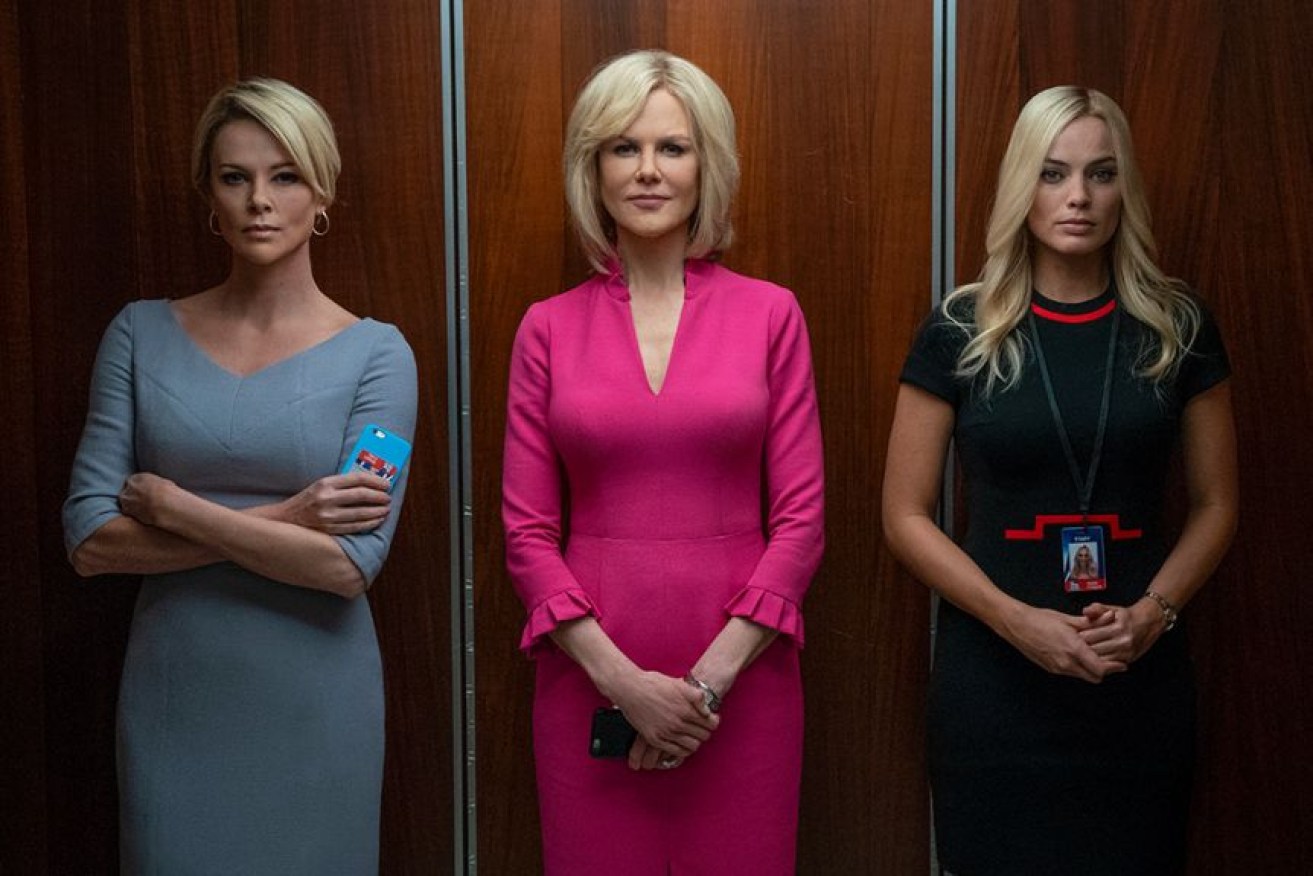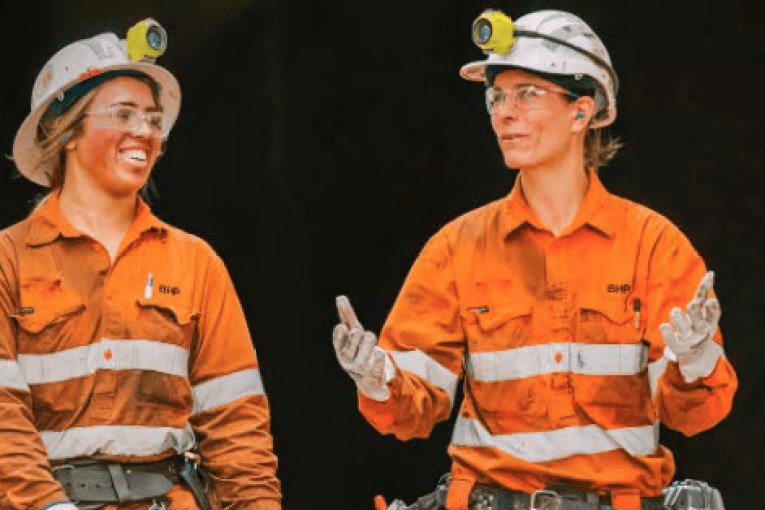Has AMP’s disgrace given Australian business its own #MeToo moment?
If financial services giant AMP really wants to change its culture, there’s no need to keep updating the handbook on diversity and inclusion — it should start listening to its women.

The 2019 film Bombshell highlighted workplace sexual harassment in the MeToo era. (Photo: Supplied, Studio Canal)
During an internal revolt by AMP’s female staff last month, one woman called for the company to sack the man at the centre of AMP’s latest sexual harassment controversy, Boe Pahari, and added: “How we change culture is by doing shit and not just talking about doing shit.”
She was among a number of outraged AMP female staff members at a virtual town hall-style meeting held last month, detailed in an Australian Financial Review report.
In that meeting of about 100 staff, held via Microsoft Teams, AMP group executive of people and corporate affairs Helen Livesey was forced to respond to furious employees over the scandal involving Pahari, who has now stood down from the role of AMP Capital chief executive but remains with the company at his previous level.
It’s a blunt, yet telling, summation of the problem that faces not only AMP but much of corporate Australia.
A company’s culture is not about a piece of paper that says sexual harassment won’t be tolerated or a tick-the-box exercise on diversity targets (although that’s not to dismiss the importance of appointing more talented women to senior roles).
It’s about how people at the top treat their subordinates. It’s about what action is taken in response to those so-called “one-off” cases of inappropriate behaviour and comments.
The perpetrators will often profess that their comments were innocent; they did not intend to hurt or offend.
‘It was a compliment’, they will say, or they were just taking an interest in their colleague, or it was just a harmless joke.
But these one-off incidents tend to become patterns.
Once entrenched, they are impossible to get rid of, because the standard of what is acceptable is set.
Anyone who questions the standard is seen as a troublemaker and, in the worst-case scenario, demoted or sacked.
In virtually every case the #MeToo movement has brought to light — from Harvey Weinstein and Roger Ailes to former High Court justice Dyson Heydon — how men in positions of power treat female subordinates typically doesn’t start with full-blown harassment.
It often starts with an inappropriate comment, a questionable invitation or an uncomfortable gesture — and how management in workplaces treat those instances matter.
According to a 2018 Australian Human Rights Commission (AHRC) survey, 72 per cent of Australians over 15 have experienced sexual harassment in their lifetimes, while 23 per cent of women and 16 per cent of men said they had been harassed at work.
‘Prohibitive to tell a man who holds the keys to your future, no’
As outsiders, we will never know the full details of what exactly happened between Pahari and his subordinate.
But it appears the problems didn’t begin on the UK work trip in May 2017, which is the crux of the seven-page complaint by Julia Szlakowski.
Szlakowski is represented by Maurice Blackburn locally and Golenbock Eiseman Assor Bell & Peskoe in New York.
The New York firm represented former anchor Gretchen Carlson in her lawsuit against Fox News boss Roger Ailes, the story of which was turned into Hollywood movie Bombshell.
Szlakowski was AMP Capital’s first hiring in North America in late 2016 and reported to Pahari, who was then the company’s global head of infrastructure equity.
Pahari, 58, is almost two decades older than Szlakowski, who was in her mid-30s at the time of the incident.
Her complaint, released to Nine newspapers, alleged Pahari’s earliest interactions included him commenting on her leaving work-related functions too early in the evening and asking her to tell him the age of the oldest man she had ever dated.
But the complaint also alleged that Pahari’s behaviour escalated in May 2017 when he spent $US10,000 in company funds to fly Szlakowski to a London team meeting.
On this trip he allegedly separated her from the rest of the team at a dinner and insisted she accompany him late at night to an exclusive members-only club, Loulou’s, to meet friends from his Ferrari-driving club.
Szlakowski said in her complaint she had been uncomfortable being asked by her boss to secretly leave a work dinner but that, “It is very problematic, and perhaps prohibitive, to tell a man who holds the keys to your future, ‘no.’”
He allegedly insisted she extend her stay in the UK and keep it secret from the company.
If she refused to accept his offer to buy her clothes, he allegedly told her she was “humiliating” him and effectively accusing him of having a “limp dick”.
After an investigation, Pahari was penalised by AMP with a 25 per cent reduction in his annual bonus, which amounted to $500,000.
AMP has said that Pahari received counselling over remarks and that an investigation led by an external expert found that many of the claims were not substantiated.
AMP also described Pahari’s conduct as constituting “lower-level breaches” of the company’s code of conduct.
Following the investigation, Pahari said: “I genuinely regret that my comments made a colleague feel uncomfortable. It was never my intention, but I accept that they had an impact and I apologised and accepted the consequences.”
“I have learned from the matter and have applied those learnings in trying to ensure that our employees feel safe and valued at work.
“I am embarrassed by the matter as I believe in building diverse teams and respecting all individuals I work with, both within and outside our business.”
However, even if just some of the allegations were substantiated, that should have been enough to make the board question whether Pahari was the right appointment to the highest-paid and most prominent position in the company’s key AMP Capital division.
The board’s decision has not only caused the company reputational damage, but investor outcry so strong that on Monday AMP chairman David Murray and fellow board member John Fraser resigned, and Debra Hazelton was appointed as AMP’s new chair.
Hazelton is only the second woman to be appointed to that role in the company’s history (Catherine Brenner being the only other), and over the past two decades, all of AMP’s chief executives have been men.
Across corporate Australia, while more women are being appointing to boards, a report by Chief Executive Women (CEW) shows just 12 of Australia’s top 200 listed companies had a female chief executive at the end of 2019, a drop from 14 in 2018.
And since these allegations have surfaced, a number of AMP’s senior women have walked out the door and others are considering following.
The scandal comes after a string of disasters for the company — painfully dissected during the banking royal commission — including charging customers fees without providing a service and lying to the regulator about the problems.
According to an AMP female staff member’s words at the virtual town hall meeting, this is AMP’s #MeToo moment.
Or as another female staff member put it: “We keep saying, ‘we’re going to change our culture’, and then things happen. And ‘Oh, it’s another learning opportunity’. But when is it going to be that there’s going to be actual consequences that we see? Is Boe [Pahari] truly the best that we can do?”
It appears AMP’s board and management have started asking themselves these questions.
Louise Davidson is chief executive of the Australian Council of Superannuation Investors, whose members include 38 Australian and international asset owners and institutional investors that collectively own on average 10 per cent of every ASX 200 company.
As she explains: “Diversity policies aren’t worth the piece of paper they’re written on if you have these sorts of situations.”
“We will never have gender diversity in workplaces if sexual harassment is rewarded.”
-ABC












